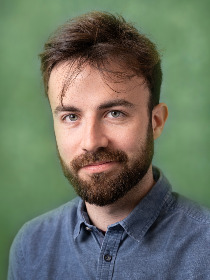
The transition to a more sustainable energy system is not only a technical challenge, but also a social one. How do you ensure that people feel involved in the choices that are made? And how do you give them a meaningful voice in the process? M20 PhD candidate Adrien Chanteloup is investigating how citizens, policymakers and scientists can be brought closer together. His research is broad in scope and brings together insights from fields such as psychology, geography and political science.
M20 PhD candidate Adrien Chantaloup: ‘People who trust their neighbours are more willing to participate’
Much of this research focuses on developing new methods, models and applications that contribute to a more sustainable world. In addition to the technological side of sustainability, there is another, equally important question: how do we ensure that people are actually involved in this transition? Who decides how our future energy supply will be organised? And what is needed to make citizen involvement truly meaningful? Within this context, M20 PhD candidate Adrien Chanteloup is investigating how we can make energy policy fairer, more inclusive and more future-proof.
“For this research, I have drawn on all available tools from a wide range of disciplines, from psychology to geography, from political science to cultural studies, which makes the research particularly multidisciplinary.” Adrien Chanteloup talks passionately about the subject he has been working on intensively for over two years now: citizen participation in the energy transition and the decision-making process surrounding it. “I strongly believe in the importance of democratising the energy transition: it is the only way to ensure that no one is left behind in the greatest challenge of our time: climate change.”
‘The original research proposal focused primarily on stimulating the development of so-called energy communities, sustainable energy collectives set up by citizens. So it was very practice-oriented. The energy debate is still mainly conducted from an economic and technological perspective. Involving citizens and the behavioural changes that this requires play only a minor role. Together with my supervisors Goda Perlaviciute (Psychology) and Lea Distelmeijer (Energy Law), I decided to take a step back for this research and look at how we can make the energy transition democratic by asking citizens what role they want to play in decision-making about energy.
‘In my first article within the research, I focus on the question of why someone would want to participate in a sustainable energy initiative, actively contribute ideas about the overall energy supply of a country or even of Europe.’ To find answers to these questions, Adrien conducted door-to-door interviews in both his native Normandy, where many large energy parks are being built, and in the suburbs of Groningen. “In the Normandy countryside in particular, there was a lot of dissatisfaction with current energy policy and sustainable energy projects: their environment is being filled with wind turbines, and some people felt that this electricity only benefits the cities and that they themselves do not benefit from it.”
The bond that people have with their environment plays a major but complex role in a person’s willingness to participate in a local energy project, Adrien discovered: ‘People who trust their neighbours are more willing to participate. They think: great, we’ll all benefit from it. But among them there are also those who do not participate because they think their neighbours are much better at it than they are. At the other end of the spectrum are people who do not trust their neighbours but do want to participate to prevent their neighbours from gaining too much power.
The most important conclusion I can draw from these interviews is that, under certain conditions, people definitely want to participate in something as complex as energy governance. Policy makers The ideas that the interviewees themselves put forward with regard to the energy transition are the subject of the second phase of Adrien’s research. ‘I wanted to know what they thought should be done differently and better. This yielded a lot of creative suggestions and a striking number of comments about reducing energy consumption as a counterbalance to the ever-increasing production of energy.
Adrien has two research topics in mind for the final phase of his research. “After talking to citizens, I am now talking to policymakers: people from ministries, researchers, think tanks, lobbyists, but also people from a cooperative. Through these conversations, I want to map out how much room there actually is for citizens to participate in energy governance.”
Finally, Adrien wants to look at a new social contract: ‘How do we all want to organise society and how do we adapt the technical organisation of the energy system to this? Citizen involvement and participation are essential to make the distribution of energy fairer and prevent energy poverty. But also to ensure that the burden of this energy transition is shared fairly, so that the rich cannot maintain their precious lifestyles at the expense of the poor.
This article was originally published on the Ubbo Emmius Foundation website. Author: Kirsten Otten